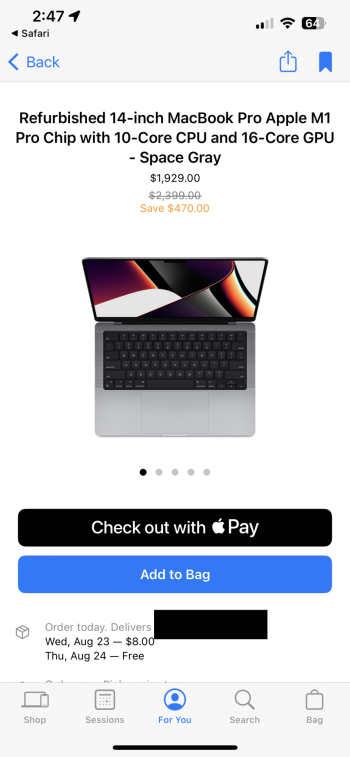Thanks. As in all decisions that can frustrate us consumers, part of the magic of fans is the rationalizations in defense of them. Classics like "it's not a notch, it's more screen R.E. to the left and right" seem to illustrate this well. I'm quite sure it WAS a notch. It's hard to miss the notch. I'm quite sure it
is there. But that not-a-notch created only by subtraction of bezel to the left & right was a dazzler!

Apple can make
ANY decisions it wants and the fans will rationalize it (passionate support
for Butterfly keyboards even when the real issues began to pile up, why 1TB RAM in iDevices was "plenty" while Apple clung to that too long, why a 1080p AppleTV made no sense while Apple clung to 720p and then why a 4K AppleTV made no sense while Apple clung to 1080p (overwhelmingly the very same reasons by the way, currently waiting to be resurrected again as the call for an 8K AppleTV begins to build), and on and on).
I recall iPad 1s launch with no front-facing camera and that was passionately rationalized against anyone saying it should have had one... until iPad 2 rolled out with one and then that was spun as a primary reason to upgrade. I recall 2 iPad models launching in a single event: one with retina and one without. The former's retina was THE gushingly, positive reason to upgrade while the latter "did not need" retina... until the next year when the latter rolled out with a retina screen and then retina
was the reason to upgrade.
I recall massive ridicule of phablet-sized phones while Apple clung to 3.5" and then 4" as "perfection"... until Apple went phablet and now almost all ridicule small screen phone wishes. NFC (pay by phone) was dumb, stupid, nobody needed... until Apple Pay at which point people wanted to boycott any stores that wouldn't let them pay with Apple Pay.
I could write a hundred examples here but hopefully the point is somewhat made. Apple and/or fans will always come up with what can seem like plausible reasons for such decisions and, when some seem to stick, they will get reposted and reposted until they gain some steam in being believed, accepted, etc. Soon people are just offering them up as if they are fact.
To buy the "Apple had to go single chip SSD because of supply chain" logic means that mighty Apple was "forced" into the half-speed choice because the flash memory industry gets to decide what they want to make and Apple has to shop & buy only whatever that industry chooses to offer... that Apple has no say and these supply chain players are actually the ones that heavily influence key features of Apple tech.
Meanwhile, chips with Ms and As and Ts, etc branded on them, specifically and intricately designed for Apple and only Apple are purchased by Apple... and those chips are made as Apple wants them... to Apple's own specifications. To believe the "supply chain driver" excuse implies that Apple could not do the same with (much less complex) SSD chips... that Apple is at the mercy of whatever the flash memory industry wishes to offer.
Personally, I believe that if Apple wanted TWO 128GB Flash modules for M2 computers instead of ONE 256GB module, multiple flash manufacturers would have fallen all over themselves trying to get Apple's business... as is the case with TSMC and key competitors like Samsung, etc. for custom Apple chip orders. In fact, since someone was ALREADY able to make the dual 128GB chips for M1, it would have been SIMPLER than new M or A or T chip orders because all it would have taken is to leave an
established line in place and keep making them for
this huge Apple order.
Nevertheless, if we still wish to believe the supply chain has dominant say in SSD configurations, let's hope the Flash manufacturers decide to only sell 512GB or 1TB modules to Apple so that the 256GB minimum is "forced" larger. And hopefully they can call their RAM-making friends to force 8GB to 16GB or 32GB or whatever each of us would like to see in base specs. I thought such decisions were mighty Apples to make, motivated by Apples money buying whatever it wants. But if the supply chain gets to decide such things, let's hope they "force" Apple to upgrade both for future Macs by simply not making 256GB SSD or 8GB RAM available to Apple anymore. Who knew almost no-name supply-chain players actually get to decide key spec features in our new Macs?

The moral of this story: just because we read something posted 50 or 500 times doesn't mean it is true. Applying a little "think different" against such facts should easily poke some big holes in this particular bit of very popular rationalization. With rare exception, I doubt modern Apple has "no choice" about anything that goes into Apple hardware. The pile of Apple money will buy them
anything THEY want in there.


